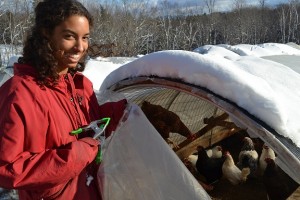Read more at http://www.blacklandproject.org/todays-black-farmer/
Close your eyes and envision a black relationship to land. You might picture a farmer: a man whose weathered hands match his wise, deeply lined face. He might be anywhere in the deep south, slowly driving a tractor across the hundred acres of earth his people have farmed for generations.
Now, open your eyes and meet today’s black farmer…
Leah Penniman is a young and female, part of the new trend of black women entering commercial agriculture as a social, as well as economic, enterprise. Like many of today’s new landholders, she earns much of her income off the farm: she works full time as a science teacher at Albany’s Tech Valley High School. And Penniman’s Soul Fire Farm isn’t in the steamy or dusty south. You’ll find her feeding her pullets at the end of a short dirt road off Route 2 in upstate New York.
As part of a working farm family, Penniman is quick to dispel romantic notions about what it took to move from a city to have access to rural land for farming:
We lived in the ’hood for five years, on Grand Street in downtown Albany in a predominately African-American neighborhood with the community garden, the preschool, all our friends around the corner… All the time we were living in Albany, we were also coming out here on the weekends putting in the road, putting in the barn, the septic, the well … I mean everything. With our hands. From the ground up. Talk about relationship to land!
I hated this land a lot, too. We bought it, it was beautiful, it’s amazing, it’s a spiritual vortex, it’s the only place with open fields here in the mountains. But the work, the work and the money, almost killed me…. But we’re here. So it’s good.
In addition to teaching, Penniman and her husband are rearing two children, raising a flock of laying hens and growing 75 varieties of veggies each season. Running a CSA, especially one “committed to making real food available to everyone” with a sliding price scale, means she is also running a business. She drives more than 40 miles on Fridays and Sundays to deliver eggs and vegetables to her 25 CSA shareholders in Albany, Troy and Rensselaer, NY.
Penniman’s story reminds us that rooting ourselves in rural agricultural land requires a level of physical labor that is new to most of us. Equally challenging to new farmers who are not on heritage land is the level of financial and emotional commitment to place farming requires. That commitment may be deeper, and more demanding, than anything a non-farmer will ever have a chance to know.

